高中英语阅读理解课教案设计.doc
高中英语阅读课教案
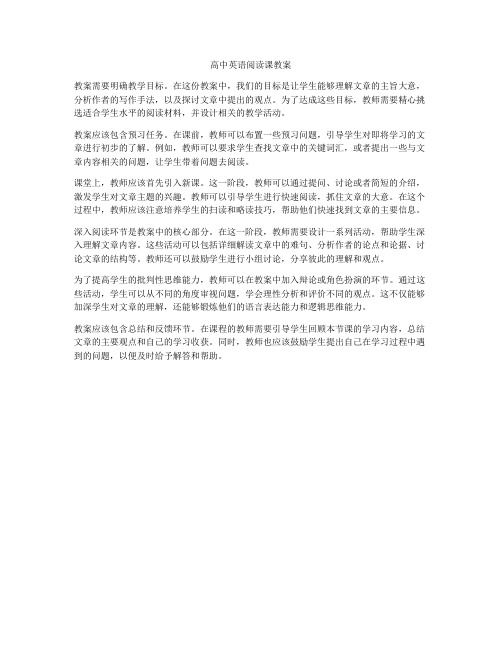
高中英语阅读课教案
教案需要明确教学目标。
在这份教案中,我们的目标是让学生能够理解文章的主旨大意,分析作者的写作手法,以及探讨文章中提出的观点。
为了达成这些目标,教师需要精心挑选适合学生水平的阅读材料,并设计相关的教学活动。
教案应该包含预习任务。
在课前,教师可以布置一些预习问题,引导学生对即将学习的文章进行初步的了解。
例如,教师可以要求学生查找文章中的关键词汇,或者提出一些与文章内容相关的问题,让学生带着问题去阅读。
课堂上,教师应该首先引入新课。
这一阶段,教师可以通过提问、讨论或者简短的介绍,激发学生对文章主题的兴趣。
教师可以引导学生进行快速阅读,抓住文章的大意。
在这个过程中,教师应该注意培养学生的扫读和略读技巧,帮助他们快速找到文章的主要信息。
深入阅读环节是教案中的核心部分。
在这一阶段,教师需要设计一系列活动,帮助学生深入理解文章内容。
这些活动可以包括详细解读文章中的难句、分析作者的论点和论据、讨论文章的结构等。
教师还可以鼓励学生进行小组讨论,分享彼此的理解和观点。
为了提高学生的批判性思维能力,教师可以在教案中加入辩论或角色扮演的环节。
通过这些活动,学生可以从不同的角度审视问题,学会理性分析和评价不同的观点。
这不仅能够加深学生对文章的理解,还能够锻炼他们的语言表达能力和逻辑思维能力。
教案应该包含总结和反馈环节。
在课程的教师需要引导学生回顾本节课的学习内容,总结文章的主要观点和自己的学习收获。
同时,教师也应该鼓励学生提出自己在学习过程中遇到的问题,以便及时给予解答和帮助。
高中英语阅读理解优秀教案

高中英语阅读理解优秀教案教学目标1. 提高学生的快速阅读与精读能力。
2. 培养学生的预测、推理及归纳总结能力。
3. 加强学生对文章结构的理解,以及主旨大意的把握。
4. 引导学生学会使用不同的阅读策略,如略读、寻读等。
5. 增强学生对细节信息的关注力和理解深度。
教学内容选择一篇适合高中生阅读水平的英文文章,内容涵盖文化、科技、社会等多个方面,确保文本具有一定的信息密度和思想深度。
教学步骤导入阶段- 开始上课前,通过提问或讨论的方式激发学生对文章主题的兴趣。
例如,可以询问学生对某一话题的了解或看法。
- 简要介绍文章的背景知识,为学生阅读全文做好铺垫。
快速阅读阶段- 要求学生快速阅读全文,抓住文章的大意。
- 通过提问检验学生的快速阅读效果,如询问文章的主旨或作者的观点。
详细解读阶段- 分段讲解文章,重点解析词汇、短语和句型结构。
- 鼓励学生提出疑问,并及时给予解答。
- 引导学生分析文章的结构和段落之间的逻辑关系。
深度探讨阶段- 组织小组讨论,让学生就文章中的某些观点或论据进行深入探讨。
- 指导学生如何从不同角度理解和分析文章内容。
策略训练阶段- 教授学生如何运用略读、寻读等阅读策略来寻找关键信息。
- 通过练习题让学生实践这些策略。
总结归纳阶段- 回顾全文,总结文章的主要内容和语言特点。
- 强调阅读理解中的关键技巧和方法。
作业布置- 布置相关的阅读理解练习题,以巩固课堂所学。
- 鼓励学生阅读额外的英文材料,提高自主学习能力。
教学反思- 课后,教师应根据学生的表现和反馈,对教学方法和内容进行调整。
- 分析哪些教学环节有效,哪些需要改进,以便在未来的教学中取得更好的效果。
高中英语阅读教案
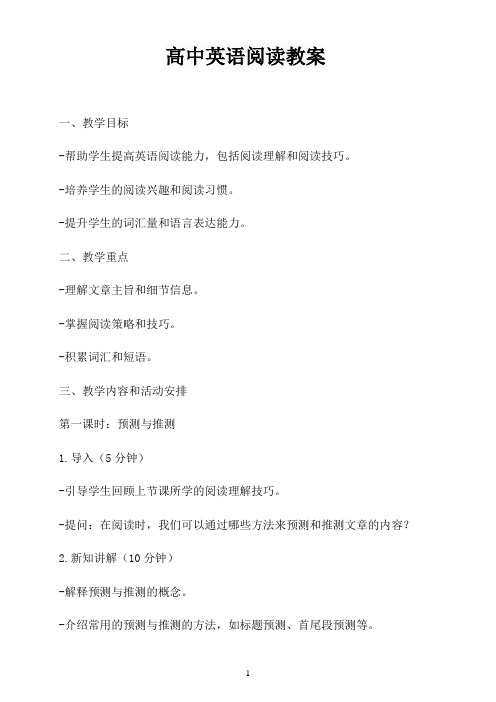
高中英语阅读教案一、教学目标-帮助学生提高英语阅读能力,包括阅读理解和阅读技巧。
-培养学生的阅读兴趣和阅读习惯。
-提升学生的词汇量和语言表达能力。
二、教学重点-理解文章主旨和细节信息。
-掌握阅读策略和技巧。
-积累词汇和短语。
三、教学内容和活动安排第一课时:预测与推测1.导入(5分钟)-引导学生回顾上节课所学的阅读理解技巧。
-提问:在阅读时,我们可以通过哪些方法来预测和推测文章的内容?2.新知讲解(10分钟)-解释预测与推测的概念。
-介绍常用的预测与推测的方法,如标题预测、首尾段预测等。
3.练习活动(15分钟)-分发一篇短文给学生,要求他们先阅读标题和首尾段,然后预测和推测文章的内容。
-学生互相讨论自己的预测和推测结果,并与实际文章内容进行比较。
4.小结归纳(5分钟)-引导学生总结本节课所学的预测与推测技巧和方法。
第二课时:主旨与细节1.导入(5分钟)-复习上节课所学的预测与推测技巧。
-提问:在阅读时,我们如何找到文章的主旨和细节信息?2.新知讲解(10分钟)-解释主旨与细节的概念。
-介绍查找主旨和细节信息的方法,如关键词标记、标题预测等。
3.练习活动(15分钟)-分发一篇短文给学生,要求他们阅读并回答相关问题,包括主旨和细节问题。
-学生互相交流自己的答案,并与文章内容进行比较。
4.小结归纳(5分钟)-引导学生总结本节课所学的查找主旨和细节信息的技巧和方法。
第三课时:词汇积累与理解1.导入(5分钟)-复习上节课所学的主旨与细节技巧。
-提问:在阅读时,我们如何理解生词并积累新词汇?2.新知讲解(10分钟)-介绍使用上下文推测词义的方法。
-引导学生注意词根、前缀和后缀等词形变化。
3.练习活动(15分钟)-分发一篇短文给学生,要求他们阅读并找出其中的生词。
-学生互相交流自己对生词的理解,并尝试推测其词义。
4.小结归纳(5分钟)-引导学生总结本节课所学的推测词义的方法和技巧。
四、教学资源和评估方式1.教学资源-阅读材料:包括文章、短文、新闻报道等,涵盖不同主题和难度。
高中英语阅读理解教案范文全英文
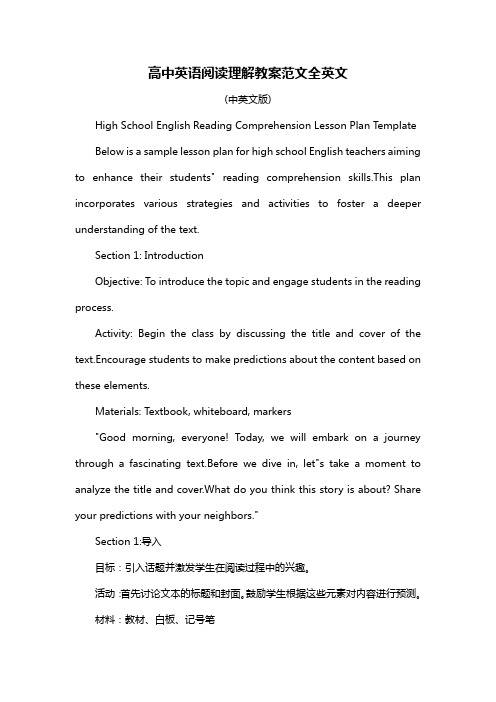
高中英语阅读理解教案范文全英文(中英文版)High School English Reading Comprehension Lesson Plan Template Below is a sample lesson plan for high school English teachers aiming to enhance their students" reading comprehension skills.This plan incorporates various strategies and activities to foster a deeper understanding of the text.Section 1: IntroductionObjective: To introduce the topic and engage students in the reading process.Activity: Begin the class by discussing the title and cover of the text.Encourage students to make predictions about the content based on these elements.Materials: Textbook, whiteboard, markers"Good morning, everyone! Today, we will embark on a journey through a fascinating text.Before we dive in, let"s take a moment to analyze the title and cover.What do you think this story is about? Share your predictions with your neighbors."Section 1:导入目标:引入话题并激发学生在阅读过程中的兴趣。
英语阅读理解公开课教案高中
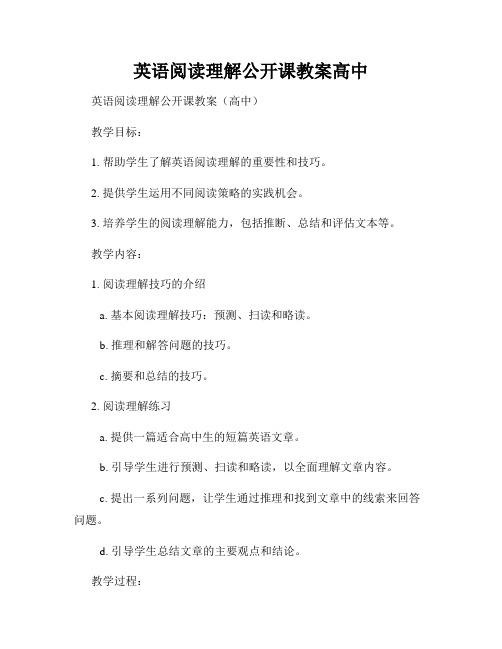
英语阅读理解公开课教案高中英语阅读理解公开课教案(高中)教学目标:1. 帮助学生了解英语阅读理解的重要性和技巧。
2. 提供学生运用不同阅读策略的实践机会。
3. 培养学生的阅读理解能力,包括推断、总结和评估文本等。
教学内容:1. 阅读理解技巧的介绍a. 基本阅读理解技巧:预测、扫读和略读。
b. 推理和解答问题的技巧。
c. 摘要和总结的技巧。
2. 阅读理解练习a. 提供一篇适合高中生的短篇英语文章。
b. 引导学生进行预测、扫读和略读,以全面理解文章内容。
c. 提出一系列问题,让学生通过推理和找到文章中的线索来回答问题。
d. 引导学生总结文章的主要观点和结论。
教学过程:1. 创设情境,引入话题在开始本节课之前,教师可以向学生简要介绍英语阅读理解的重要性,并提问学生他们在日常生活中有何困难。
2. 介绍阅读理解技巧a. 预测:让学生通过阅读标题、副标题和首段,猜测文章主题和内容。
b. 扫读:要求学生快速阅读全文,获取整体理解,并注意段落标题以及文字格式变化的线索。
c. 略读:鼓励学生在继续阅读之前,先浏览全文段落,从而了解文章的结构和组织方式。
3. 演示阅读理解技巧配合一篇短篇英语文章,教师可以演示如何使用上述技巧来理解文章,并解答一些与文章相关的问题。
4. 学生练习阅读理解技巧学生独立阅读一篇短篇英语文章,然后根据老师提出的问题,应用上述技巧进行阅读理解,并完成问题解答。
5. 学生总结文章的主要观点和结论学生可以用自己的语言总结文章的主要观点和结论,并与同学分享。
6. 教师评价和反馈教师对学生的阅读理解技巧运用和问题解答进行评价,并给予适当的反馈。
教学资源:1. 适合高中生的短篇英语文章。
2. 学生练习用的问题列表。
3. 提供学生总结的示范。
教学评估:1. 教师观察学生在阅读理解过程中使用的技巧和策略。
2. 对学生的问题解答和总结进行评估,查看他们对文章的理解程度。
3. 学生之间的互评,让他们根据彼此的回答和总结,提供反馈和建议。
高中英语阅读教学教案设计
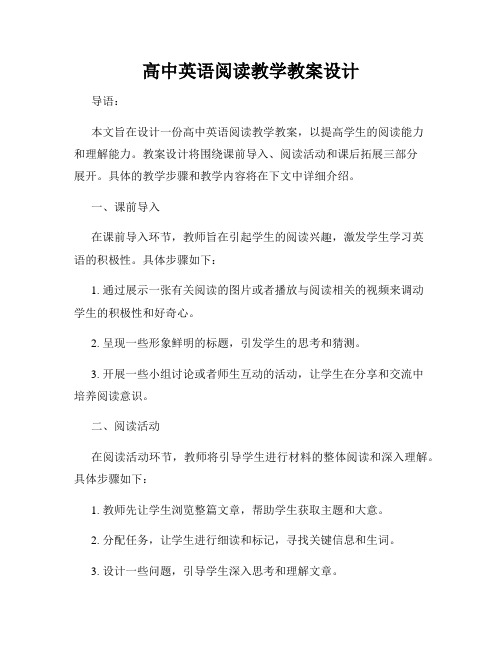
高中英语阅读教学教案设计导语:本文旨在设计一份高中英语阅读教学教案,以提高学生的阅读能力和理解能力。
教案设计将围绕课前导入、阅读活动和课后拓展三部分展开。
具体的教学步骤和教学内容将在下文中详细介绍。
一、课前导入在课前导入环节,教师旨在引起学生的阅读兴趣,激发学生学习英语的积极性。
具体步骤如下:1. 通过展示一张有关阅读的图片或者播放与阅读相关的视频来调动学生的积极性和好奇心。
2. 呈现一些形象鲜明的标题,引发学生的思考和猜测。
3. 开展一些小组讨论或者师生互动的活动,让学生在分享和交流中培养阅读意识。
二、阅读活动在阅读活动环节,教师将引导学生进行材料的整体阅读和深入理解。
具体步骤如下:1. 教师先让学生浏览整篇文章,帮助学生获取主题和大意。
2. 分配任务,让学生进行细读和标记,寻找关键信息和生词。
3. 设计一些问题,引导学生深入思考和理解文章。
4. 帮助学生掌握阅读策略,如扫读、略读和精读。
5. 引导学生进行词汇和语法的分析,培养学生的语言运用能力。
三、课后拓展在课后拓展环节,教师将组织学生进行一些拓展活动,以促进学生在阅读中的自主学习和思考。
具体步骤如下:1. 布置一些与文章内容相关的作业,如写一篇小短文、设计一个续写、形成自己的问题等,以检验学生对文章的理解和运用能力。
2. 推荐一些相关的阅读材料,鼓励学生拓宽阅读视野。
3. 鼓励学生与同学分享自己的阅读心得和体会,培养合作学习的氛围。
结语:通过本节课的阅读教学活动,学生应该能够提高他们的阅读能力和理解能力,同时也能培养他们的自主学习和合作学习的能力。
希望通过本教案设计,能够为高中英语阅读教学提供一种有效的教学参考。
高中英语阅读理解教案
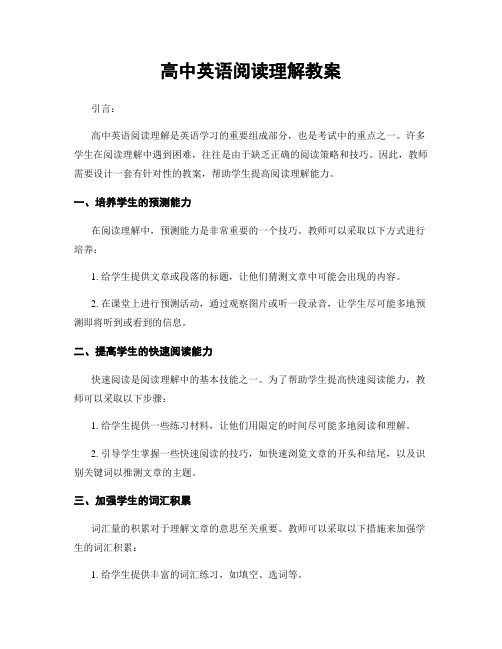
高中英语阅读理解教案引言:高中英语阅读理解是英语学习的重要组成部分,也是考试中的重点之一。
许多学生在阅读理解中遇到困难,往往是由于缺乏正确的阅读策略和技巧。
因此,教师需要设计一套有针对性的教案,帮助学生提高阅读理解能力。
一、培养学生的预测能力在阅读理解中,预测能力是非常重要的一个技巧。
教师可以采取以下方式进行培养:1. 给学生提供文章或段落的标题,让他们猜测文章中可能会出现的内容。
2. 在课堂上进行预测活动,通过观察图片或听一段录音,让学生尽可能多地预测即将听到或看到的信息。
二、提高学生的快速阅读能力快速阅读是阅读理解中的基本技能之一。
为了帮助学生提高快速阅读能力,教师可以采取以下步骤:1. 给学生提供一些练习材料,让他们用限定的时间尽可能多地阅读和理解。
2. 引导学生掌握一些快速阅读的技巧,如快速浏览文章的开头和结尾,以及识别关键词以推测文章的主题。
三、加强学生的词汇积累词汇量的积累对于理解文章的意思至关重要。
教师可以采取以下措施来加强学生的词汇积累:1. 给学生提供丰富的词汇练习,如填空、选词等。
2. 引导学生使用词根、词缀等技巧来推测单词的意思。
3. 鼓励学生积极阅读英语原版的书籍、报纸和杂志,提高词汇量和阅读理解能力。
四、培养学生的推理能力阅读理解中常常涉及到一些推理题,教师可以通过以下方式培养学生的推理能力:1. 给学生提供一些推理练习题,引导他们通过文章中的线索来推测相关的信息。
2. 引导学生从文章的上下文中推理出未知词汇的意思。
五、提高学生的阅读速度阅读速度是阅读理解中的关键。
为了提高学生的阅读速度,教师可以采取以下方法:1. 给学生提供一些快速阅读的练习,要求他们在规定的时间内尽可能多地阅读和理解文章。
2. 鼓励学生每天进行一定时间的阅读练习,逐渐提高他们的阅读速度。
六、引导学生进行有效的阅读注释阅读注释是一种提高阅读理解能力的有效方法。
教师可以通过以下步骤引导学生进行有效的阅读注释:1. 教授学生如何标记和注释关键词、重点句子和段落。
高中英语阅读教案
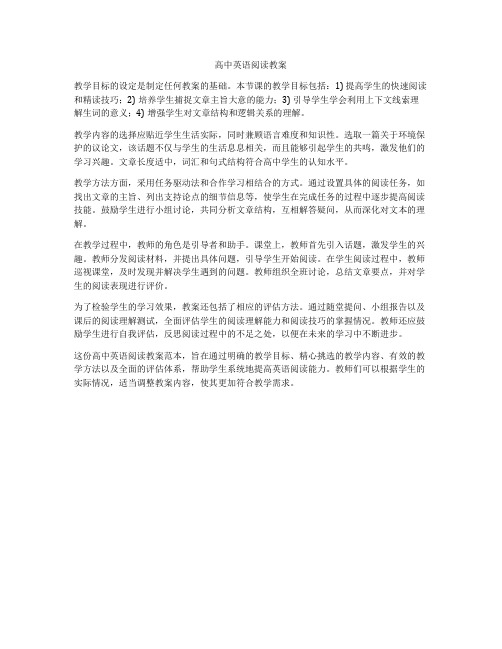
高中英语阅读教案教学目标的设定是制定任何教案的基础。
本节课的教学目标包括:1) 提高学生的快速阅读和精读技巧;2) 培养学生捕捉文章主旨大意的能力;3) 引导学生学会利用上下文线索理解生词的意义;4) 增强学生对文章结构和逻辑关系的理解。
教学内容的选择应贴近学生生活实际,同时兼顾语言难度和知识性。
选取一篇关于环境保护的议论文,该话题不仅与学生的生活息息相关,而且能够引起学生的共鸣,激发他们的学习兴趣。
文章长度适中,词汇和句式结构符合高中学生的认知水平。
教学方法方面,采用任务驱动法和合作学习相结合的方式。
通过设置具体的阅读任务,如找出文章的主旨、列出支持论点的细节信息等,使学生在完成任务的过程中逐步提高阅读技能。
鼓励学生进行小组讨论,共同分析文章结构,互相解答疑问,从而深化对文本的理解。
在教学过程中,教师的角色是引导者和助手。
课堂上,教师首先引入话题,激发学生的兴趣。
教师分发阅读材料,并提出具体问题,引导学生开始阅读。
在学生阅读过程中,教师巡视课堂,及时发现并解决学生遇到的问题。
教师组织全班讨论,总结文章要点,并对学生的阅读表现进行评价。
为了检验学生的学习效果,教案还包括了相应的评估方法。
通过随堂提问、小组报告以及课后的阅读理解测试,全面评估学生的阅读理解能力和阅读技巧的掌握情况。
教师还应鼓励学生进行自我评估,反思阅读过程中的不足之处,以便在未来的学习中不断进步。
这份高中英语阅读教案范本,旨在通过明确的教学目标、精心挑选的教学内容、有效的教学方法以及全面的评估体系,帮助学生系统地提高英语阅读能力。
教师们可以根据学生的实际情况,适当调整教案内容,使其更加符合教学需求。
高中英语阅读教案
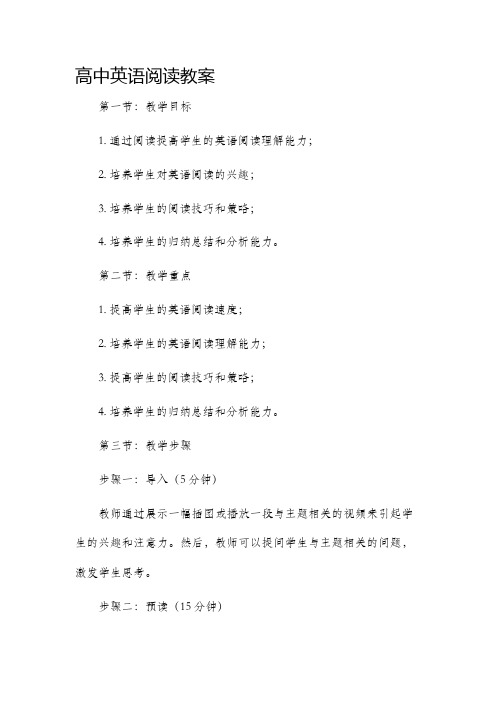
高中英语阅读教案第一节:教学目标1. 通过阅读提高学生的英语阅读理解能力;2. 培养学生对英语阅读的兴趣;3. 培养学生的阅读技巧和策略;4. 培养学生的归纳总结和分析能力。
第二节:教学重点1. 提高学生的英语阅读速度;2. 培养学生的英语阅读理解能力;3. 提高学生的阅读技巧和策略;4. 培养学生的归纳总结和分析能力。
第三节:教学步骤步骤一:导入(5分钟)教师通过展示一幅插图或播放一段与主题相关的视频来引起学生的兴趣和注意力。
然后,教师可以提问学生与主题相关的问题,激发学生思考。
步骤二:预读(15分钟)教师为学生分发一篇阅读材料,并简要介绍文章的背景和主要内容。
然后,教师可以让学生浏览文章的标题、题图、图表等,预测文章的内容和结构。
学生可以在文本中划出重点词汇,并进行相关的背景知识补充。
步骤三:阅读(30分钟)学生开始阅读文章,可以根据自己的阅读能力和速度自主选择阅读方式,可以整篇阅读,也可以分段阅读。
学生要尽量将重要信息标注出来,例如关键词、关键句等。
阅读过程中,教师可以给予学生一些指导,帮助他们理解文本。
步骤四:讨论与总结(20分钟)教师可以提出一些问题,让学生进行讨论和思考。
例如,对于文章中的某个观点或事件,学生可以就其利弊、原因、影响等进行讨论。
然后,教师可以引导学生进行总结和归纳,梳理出文章的主要内容和观点。
学生可以用自己的话对文章进行复述。
步骤五:拓展(10分钟)教师可以提供一些相关的拓展材料,例如其他相关的阅读材料、音频或视频等,以帮助学生深入了解和拓展所学内容。
学生可以选择进行自主阅读,然后进行小组或全班分享。
第四节:教学方法1. 预测法:通过浏览文章的标题、问题或题图等元素,预测文章的内容和结构,提前激发学生对文章的兴趣和好奇心。
2. 标注法:学生在阅读过程中可以使用不同的标记方式来标注关键词、信息和观点,有助于加强记忆和理解。
3. 讨论法:通过小组或全班讨论的方式,让学生积极参与,提出自己的观点和思考,加深对文章的理解。
高中英语阅读理解教案
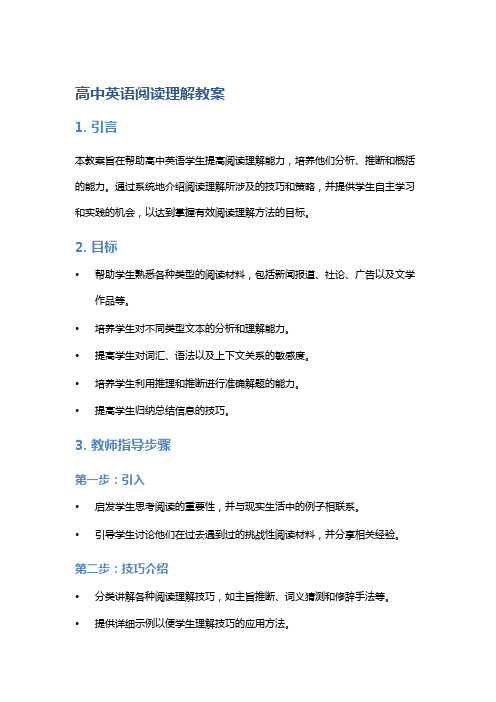
高中英语阅读理解教案1. 引言本教案旨在帮助高中英语学生提高阅读理解能力,培养他们分析、推断和概括的能力。
通过系统地介绍阅读理解所涉及的技巧和策略,并提供学生自主学习和实践的机会,以达到掌握有效阅读理解方法的目标。
2. 目标•帮助学生熟悉各种类型的阅读材料,包括新闻报道、社论、广告以及文学作品等。
•培养学生对不同类型文本的分析和理解能力。
•提高学生对词汇、语法以及上下文关系的敏感度。
•培养学生利用推理和推断进行准确解题的能力。
•提高学生归纳总结信息的技巧。
3. 教师指导步骤第一步:引入•启发学生思考阅读的重要性,并与现实生活中的例子相联系。
•引导学生讨论他们在过去遇到过的挑战性阅读材料,并分享相关经验。
第二步:技巧介绍•分类讲解各种阅读理解技巧,如主旨推断、词义猜测和修辞手法等。
•提供详细示例以便学生理解技巧的应用方法。
第三步:阅读练习•提供多个不同类型的阅读材料。
•学生独立或合作阅读,并使用所学技巧进行分析和解题。
•教师提供指导和反馈。
第四步:讨论与分享•鼓励学生分享他们的答案和解题思路。
•引导学生互相评价和纠正,加深对阅读理解技巧的理解。
第五步:总结与检验•总结本节课所学的关键技巧和策略,并逐一复习。
•进行一次小测验,以评估学生对课堂内容的掌握情况。
4. 学生自主活动建议为了巩固所学知识并培养良好的阅读习惯,教师可以鼓励学生在家中开展以下活动:•每天坚持阅读英语资料,包括新闻文章、综合材料等。
•自主选取许多不同类型的文章,并使用所学技巧进行分析和总结.•建立词汇和短语的卡片,用于记忆和巩固。
5. 教学评估与反思根据学生的表现和活动情况,教师可以进行以下评估与反思:•学生的阅读理解能力是否有所提高?是否能有效应用所学技巧?•学生通过自主活动是否积极参与,并在实践中不断提升自己的能力?•教案设计是否足够清晰和具体,对学生进行个性化指导?是否需要进行进一步改进?总结通过本教案,我们旨在帮助学生掌握高中英语阅读理解技巧和策略。
高中英语阅读理解教案
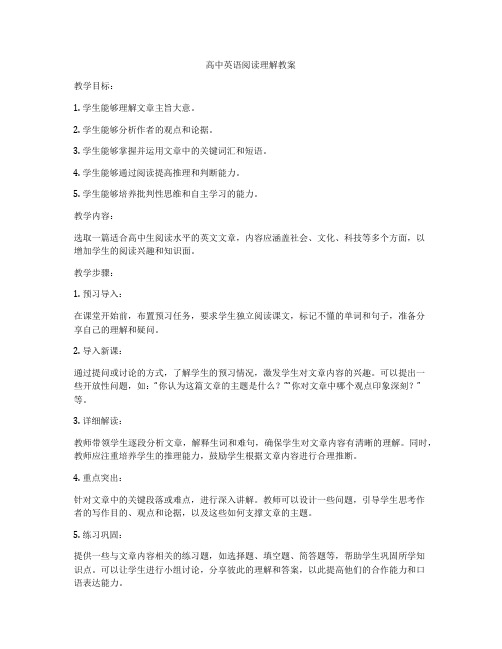
高中英语阅读理解教案教学目标:1. 学生能够理解文章主旨大意。
2. 学生能够分析作者的观点和论据。
3. 学生能够掌握并运用文章中的关键词汇和短语。
4. 学生能够通过阅读提高推理和判断能力。
5. 学生能够培养批判性思维和自主学习的能力。
教学内容:选取一篇适合高中生阅读水平的英文文章,内容应涵盖社会、文化、科技等多个方面,以增加学生的阅读兴趣和知识面。
教学步骤:1. 预习导入:在课堂开始前,布置预习任务,要求学生独立阅读课文,标记不懂的单词和句子,准备分享自己的理解和疑问。
2. 导入新课:通过提问或讨论的方式,了解学生的预习情况,激发学生对文章内容的兴趣。
可以提出一些开放性问题,如:“你认为这篇文章的主题是什么?”“你对文章中哪个观点印象深刻?”等。
3. 详细解读:教师带领学生逐段分析文章,解释生词和难句,确保学生对文章内容有清晰的理解。
同时,教师应注重培养学生的推理能力,鼓励学生根据文章内容进行合理推断。
4. 重点突出:针对文章中的关键段落或难点,进行深入讲解。
教师可以设计一些问题,引导学生思考作者的写作目的、观点和论据,以及这些如何支撑文章的主题。
5. 练习巩固:提供一些与文章内容相关的练习题,如选择题、填空题、简答题等,帮助学生巩固所学知识点。
可以让学生进行小组讨论,分享彼此的理解和答案,以此提高他们的合作能力和口语表达能力。
6. 拓展提升:为了培养学生的批判性思维,教师可以提出一些挑战性的问题,如:“你同意作者的观点吗?为什么?”“如果你是作者,会如何论证你的观点?”等。
这些问题可以促使学生从不同角度思考问题,提高他们的分析和判断能力。
7. 作业布置:布置适当的家庭作业,如写一篇关于文章主题的短文,或者寻找与文章主题相关的额外阅读材料,以加强学生的自主学习能力。
8. 反馈总结:在下一节课上,教师应该对学生的作业进行点评,总结本次课程的学习成果,并对学生的学习表现给予积极的反馈。
高中英语阅读理解教案

高中英语阅读理解教案一、教学目标1.培养学生的阅读理解能力,特别是对英语文章的理解和分析能力;2.提高学生的阅读速度,培养快速获取信息的能力;3.帮助学生掌握阅读策略,如预测、推断、概括等;4.培养学生的独立思考和解决问题的能力。
二、教学重点1.学习并掌握不同类型的阅读理解题型;2.培养学生的阅读策略,提高解题效率;3.帮助学生分析和理解英语文章的逻辑结构。
三、教学内容1. 阅读理解题型1.主旨理解题:要求学生从文章中找出主要观点或主题;2.细节理解题:要求学生根据文章中的具体细节回答问题;3.推理判断题:要求学生根据已有信息进行推理判断;4.词义推测题:要求学生根据上下文推测生词或短语的意思;5.篇章结构题:要求学生理解文章的整体结构。
2. 阅读策略1.预测:学生在阅读前先猜测文章的主题、内容和结构,培养对文章的整体把握能力;2.分段阅读:学生按照文章的段落结构进行阅读,理解每一段的主题和细节,提高阅读的效率;3.词汇猜测:学生通过上下文猜测生词的意思,培养运用语境推测词义的能力;4.概括总结:学生在阅读完一篇文章后,对文章的主旨、观点和结构进行总结和概括,提高对文章的整体理解能力。
3. 阅读策略训练1.给学生提供一篇适合高中英语水平的短文,并设置不同类型的阅读理解题目;2.引导学生先预测文章的主题和结构,并提醒学生在阅读过程中注意细节;3.学生独立进行阅读训练,按照不同题型进行解题;4.辅导学生如何运用阅读策略解题,鼓励学生进行推理和概括;5.检查学生的解题情况,及时给予反馈和指导。
4. 拓展活动1.学生进行小组讨论,对一篇较长的阅读材料进行综合理解和分析;2.学生选取自己感兴趣的文章,利用所学的阅读策略进行独立阅读和理解;3.学生结合已学的语法知识和词汇积累,尝试进行英语文章的写作。
四、教学方法1.情境教学法:通过设置具体的阅读情境,激发学生的学习兴趣和阅读动力;2.合作学习法:通过小组讨论和合作解题,培养学生的合作意识和团队精神;3.演示讲解法:教师针对不同阅读理解题型进行讲解和示范,帮助学生理解题目要求和解题思路;4.实践教学法:学生通过大量的阅读练习和解题训练,巩固所学的阅读理解技巧和策略。
高中英语阅读课教案
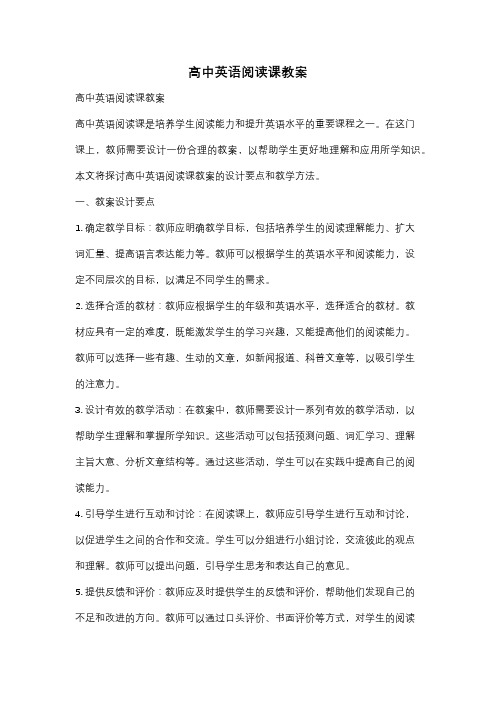
高中英语阅读课教案高中英语阅读课教案高中英语阅读课是培养学生阅读能力和提升英语水平的重要课程之一。
在这门课上,教师需要设计一份合理的教案,以帮助学生更好地理解和应用所学知识。
本文将探讨高中英语阅读课教案的设计要点和教学方法。
一、教案设计要点1. 确定教学目标:教师应明确教学目标,包括培养学生的阅读理解能力、扩大词汇量、提高语言表达能力等。
教师可以根据学生的英语水平和阅读能力,设定不同层次的目标,以满足不同学生的需求。
2. 选择合适的教材:教师应根据学生的年级和英语水平,选择适合的教材。
教材应具有一定的难度,既能激发学生的学习兴趣,又能提高他们的阅读能力。
教师可以选择一些有趣、生动的文章,如新闻报道、科普文章等,以吸引学生的注意力。
3. 设计有效的教学活动:在教案中,教师需要设计一系列有效的教学活动,以帮助学生理解和掌握所学知识。
这些活动可以包括预测问题、词汇学习、理解主旨大意、分析文章结构等。
通过这些活动,学生可以在实践中提高自己的阅读能力。
4. 引导学生进行互动和讨论:在阅读课上,教师应引导学生进行互动和讨论,以促进学生之间的合作和交流。
学生可以分组进行小组讨论,交流彼此的观点和理解。
教师可以提出问题,引导学生思考和表达自己的意见。
5. 提供反馈和评价:教师应及时提供学生的反馈和评价,帮助他们发现自己的不足和改进的方向。
教师可以通过口头评价、书面评价等方式,对学生的阅读表现进行评价。
同时,教师还可以鼓励学生互相评价,以促进学生之间的学习和进步。
二、教学方法1. 预测问题法:教师可以在学生阅读文章之前,提出一些问题,引导学生对文章内容进行预测。
这样可以激发学生的学习兴趣,增强他们的主动性和参与度。
学生可以根据自己的预测,进行阅读,并验证自己的想法。
2. 词汇学习法:教师可以提取文章中的关键词汇,帮助学生理解和掌握这些词汇的意义和用法。
教师可以通过词义解释、例句展示等方式,帮助学生记忆和运用这些词汇。
高中英语阅读课教案
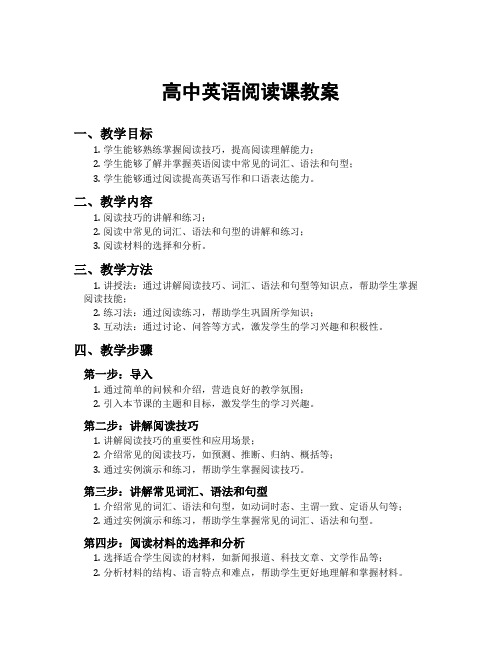
高中英语阅读课教案一、教学目标1.学生能够熟练掌握阅读技巧,提高阅读理解能力;2.学生能够了解并掌握英语阅读中常见的词汇、语法和句型;3.学生能够通过阅读提高英语写作和口语表达能力。
二、教学内容1.阅读技巧的讲解和练习;2.阅读中常见的词汇、语法和句型的讲解和练习;3.阅读材料的选择和分析。
三、教学方法1.讲授法:通过讲解阅读技巧、词汇、语法和句型等知识点,帮助学生掌握阅读技能;2.练习法:通过阅读练习,帮助学生巩固所学知识;3.互动法:通过讨论、问答等方式,激发学生的学习兴趣和积极性。
四、教学步骤第一步:导入1.通过简单的问候和介绍,营造良好的教学氛围;2.引入本节课的主题和目标,激发学生的学习兴趣。
第二步:讲解阅读技巧1.讲解阅读技巧的重要性和应用场景;2.介绍常见的阅读技巧,如预测、推断、归纳、概括等;3.通过实例演示和练习,帮助学生掌握阅读技巧。
第三步:讲解常见词汇、语法和句型1.介绍常见的词汇、语法和句型,如动词时态、主谓一致、定语从句等;2.通过实例演示和练习,帮助学生掌握常见的词汇、语法和句型。
第四步:阅读材料的选择和分析1.选择适合学生阅读的材料,如新闻报道、科技文章、文学作品等;2.分析材料的结构、语言特点和难点,帮助学生更好地理解和掌握材料。
第五步:阅读练习1.让学生阅读选定的材料,并根据所学知识点进行理解和分析;2.通过问答、讨论等方式,帮助学生深入理解和掌握材料。
第六步:总结1.总结本节课的主要内容和要点;2.强调学生需要在日常学习中多加练习,提高阅读能力和英语表达能力。
五、教学评估1.通过课堂练习和作业评估学生的阅读理解能力和英语表达能力;2.通过课后反馈和讨论,了解学生对本节课的掌握情况和反馈意见,为下一节课的教学做好准备。
六、教学建议1.教师应该根据学生的实际情况和需求,选择适合的阅读材料和教学方法;2.学生应该积极参与课堂讨论和练习,多加练习,提高阅读能力和英语表达能力。
英语课教案二:高中阅读理解练习

英语课教案二:高中阅读理解练习一、背景和目标在高中英语教学中,阅读理解是非常重要的一项内容。
因为英语阅读已经成为我们生活和工作中不可缺少的一部分,所以教师需要通过阅读理解练习,帮助学生提高语阅读叙事、议论和说明型文章的能力。
二、教学过程1.开始前引导学生主动思考和猜测文章标题,以此激发学生的兴趣和好奇心。
然后给出一些关键词,激活学生的相关经验知识。
2.阅读和理解学生进入阅读环节。
在这一环节中,学生可以自主阅读,教师也可以提供语言点和课文理解帮助学生理解文章。
3.理解和解决问题此环节是阅读理解的重点。
教师可以设置一些问题,引导学生理解文章,并解答问题,检查学生的阅读理解能力。
问题设置应注意:既要简单,又要贫困,有助于学生回溯文中答案的信息。
此外,问题解答的过程可以为学生提供文章信息的预演和掌握方法。
4.总结和反思学生完成了问题解答后,教师可以进行回顾和总结。
让学生将文中易犯的错误、易混淆的语言点、对问题理解不够彻底的问题等总结出来。
教师要引导学生彻底理解文章,找出其中的深层次信息,并整合文章中的语言知识。
三、教学策略与技巧1.激活学习者的知识和经验先探讨一些对文章内容有所帮助的关键词或词汇,可以涵盖学生的生活经验和知识体系。
2.提供语言学习机会在教学过程中,要将语言点与文章联系起来,让学生具有实践性。
例如,可以针对阅读理解所使用的句型或语言点进行练习。
3.指导学生处理海量信息学生在阅读理解过程中会受到文本内容、语言信息、题目要求等多方面的影响,要指导学生掌握信息的处理方法,循序渐进地进行阅读理解。
4.鼓励阅读,促进思考阅读有助于学生积累语言知识,但是,阅读不仅仅是为了积累语言知识,还可以在不断地阅读和思考中提高学生的加工语言信息和解决问题的能力。
四、注意事项1.适当引导学生在阅读理解过程中,教师应适当引导学生,让学生更好地理解文章。
例如,指导学生发现文本中的联词,帮助学生构建文本的逻辑关系。
2.在某种程度上解释文本在阅读理解中,教师应根据学生的情况,选取一些组织性或语言性较难的问题,给与更细致的解释,引导学生更好地理解文章。
高中英语阅读理解题教案

高中英语阅读理解题教案_高中英语阅读教案高中英语教案应当怎么写呢,详细来讲一份正规的高中英语教案应当是怎样一种格式呢,想要知道的抓紧往下看。
下面是高中英语教案的格式,供广阔的教师参考。
一、教材分析:Analysis of the Teaching material二、教学目标:Teaching alms and demands:三、教学重难点:Teaching keys and difficulties:四、教学方法:Teaching methods:五、教学工具:Teaching aids:六、教学过程:Teaching procedures:七、板书设计:Blackboard Design.八教学评价与反思一份正规的高中英语教案主要应当包含上面的八个要点,也是作为一份教案应当具有的根本格式。
高中英语《A Master of Nonverbal Humor》教案Teaching goals:1. The students will be able to know some words and expressionsto describe a person’s appearance.2. The students will be able to know something about Charlie Chaplin’s life experiences, charming character and convincing performance.3. The students will be able to further understand the meaning of laughter.4. The students will be able to have a better command of summarizing a short passage by picking out key words from the passage.5. The students will be able to master a framework of introducing a person.6. The students will experience the reading strategy of summarizing, analyzing, inferring, and evaluating.Teaching process:Step 1: lead-inHave a taste of English humor by introducing two letters between Albert Einstein and Charlie Chaplin.Albert Einstein:You are really great. Everyone understands your film although there is no line.Charlie Chaplin:You are even greater although nobody understands your theory.设计意图:教师用简短的语言概括了爱因斯坦和卓别林之间的一次书信交往。
高中英语阅读教学教案

高中英语阅读教学教案第一章:阅读理解的重要性1.1 教学目标让学生理解阅读理解在英语学习中的重要性。
培养学生对英语阅读的兴趣和自信心。
1.2 教学内容阅读理解的概念和定义。
阅读理解在英语学习中的作用。
培养学生阅读理解的策略和技巧。
1.3 教学方法讲授法:讲解阅读理解的概念和定义,引导学生思考阅读理解的重要性。
互动讨论法:分组讨论,分享个人经验,探讨阅读理解在英语学习中的作用。
1.4 教学评估小组讨论:评估学生的参与度和思考能力。
学生报告:评估学生的表达和沟通能力。
第二章:阅读理解的策略和技巧2.1 教学目标让学生掌握阅读理解的策略和技巧。
培养学生运用策略和技巧进行有效阅读。
2.2 教学内容阅读理解的策略和技巧,如预测、扫描、略读、细读等。
练习运用策略和技巧进行阅读理解。
2.3 教学方法讲授法:讲解阅读理解的策略和技巧,引导学生思考如何运用。
实践法:学生进行阅读练习,教师指导并提供反馈。
2.4 教学评估阅读练习:评估学生的理解和运用能力。
教师反馈:评估学生的进步和需要改进的地方。
第三章:词汇理解3.1 教学目标让学生理解词汇在阅读理解中的重要性。
培养学生词汇理解和扩展的能力。
3.2 教学内容词汇理解的概念和定义。
词汇扩展的策略和方法,如使用词典、上下文推断等。
3.3 教学方法讲授法:讲解词汇理解的概念和定义,引导学生思考词汇在阅读理解中的作用。
互动讨论法:分组讨论,分享个人经验,探讨词汇扩展的策略和方法。
3.4 教学评估小组讨论:评估学生的参与度和思考能力。
学生报告:评估学生的表达和沟通能力。
第四章:阅读理解的实践4.1 教学目标让学生运用所学的阅读理解策略和技巧进行实践。
培养学生的阅读理解能力和综合运用能力。
4.2 教学内容提供不同类型的阅读材料,如故事、文章、报告等。
学生独立进行阅读理解实践。
4.3 教学方法实践法:学生进行阅读理解实践,教师指导并提供反馈。
分组讨论法:学生分组讨论,分享阅读理解的心得和体会。
高中英语阅读课优秀教案
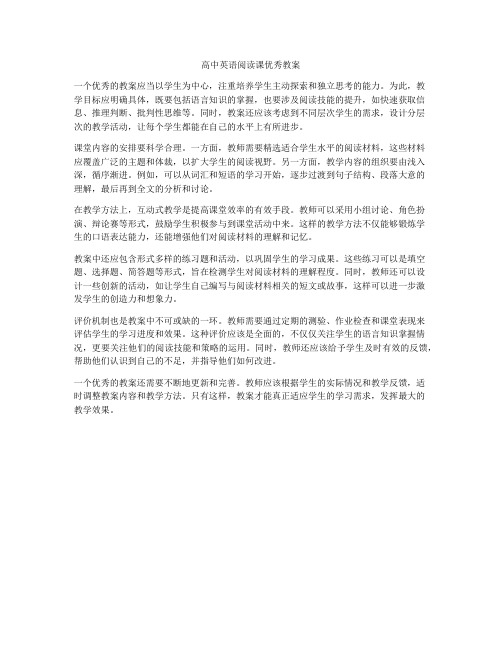
高中英语阅读课优秀教案一个优秀的教案应当以学生为中心,注重培养学生主动探索和独立思考的能力。
为此,教学目标应明确具体,既要包括语言知识的掌握,也要涉及阅读技能的提升,如快速获取信息、推理判断、批判性思维等。
同时,教案还应该考虑到不同层次学生的需求,设计分层次的教学活动,让每个学生都能在自己的水平上有所进步。
课堂内容的安排要科学合理。
一方面,教师需要精选适合学生水平的阅读材料,这些材料应覆盖广泛的主题和体裁,以扩大学生的阅读视野。
另一方面,教学内容的组织要由浅入深,循序渐进。
例如,可以从词汇和短语的学习开始,逐步过渡到句子结构、段落大意的理解,最后再到全文的分析和讨论。
在教学方法上,互动式教学是提高课堂效率的有效手段。
教师可以采用小组讨论、角色扮演、辩论赛等形式,鼓励学生积极参与到课堂活动中来。
这样的教学方法不仅能够锻炼学生的口语表达能力,还能增强他们对阅读材料的理解和记忆。
教案中还应包含形式多样的练习题和活动,以巩固学生的学习成果。
这些练习可以是填空题、选择题、简答题等形式,旨在检测学生对阅读材料的理解程度。
同时,教师还可以设计一些创新的活动,如让学生自己编写与阅读材料相关的短文或故事,这样可以进一步激发学生的创造力和想象力。
评价机制也是教案中不可或缺的一环。
教师需要通过定期的测验、作业检查和课堂表现来评估学生的学习进度和效果。
这种评价应该是全面的,不仅仅关注学生的语言知识掌握情况,更要关注他们的阅读技能和策略的运用。
同时,教师还应该给予学生及时有效的反馈,帮助他们认识到自己的不足,并指导他们如何改进。
一个优秀的教案还需要不断地更新和完善。
教师应该根据学生的实际情况和教学反馈,适时调整教案内容和教学方法。
只有这样,教案才能真正适应学生的学习需求,发挥最大的教学效果。
高中英语教案范文
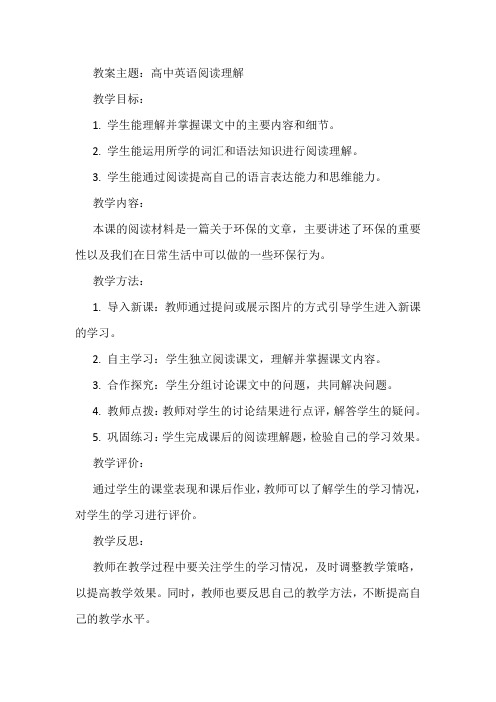
教案主题:高中英语阅读理解
教学目标:
1. 学生能理解并掌握课文中的主要内容和细节。
2. 学生能运用所学的词汇和语法知识进行阅读理解。
3. 学生能通过阅读提高自己的语言表达能力和思维能力。
教学内容:
本课的阅读材料是一篇关于环保的文章,主要讲述了环保的重要性以及我们在日常生活中可以做的一些环保行为。
教学方法:
1. 导入新课:教师通过提问或展示图片的方式引导学生进入新课的学习。
2. 自主学习:学生独立阅读课文,理解并掌握课文内容。
3. 合作探究:学生分组讨论课文中的问题,共同解决问题。
4. 教师点拨:教师对学生的讨论结果进行点评,解答学生的疑问。
5. 巩固练习:学生完成课后的阅读理解题,检验自己的学习效果。
教学评价:
通过学生的课堂表现和课后作业,教师可以了解学生的学习情况,对学生的学习进行评价。
教学反思:
教师在教学过程中要关注学生的学习情况,及时调整教学策略,以提高教学效果。
同时,教师也要反思自己的教学方法,不断提高自己的教学水平。
- 1、下载文档前请自行甄别文档内容的完整性,平台不提供额外的编辑、内容补充、找答案等附加服务。
- 2、"仅部分预览"的文档,不可在线预览部分如存在完整性等问题,可反馈申请退款(可完整预览的文档不适用该条件!)。
- 3、如文档侵犯您的权益,请联系客服反馈,我们会尽快为您处理(人工客服工作时间:9:00-18:30)。
阅读理解指导课的教学设计教学年级:高中年级教学课型:猜测词义指导课教学时长:40分钟(一)综合分析1.学生分析学生已经完成广东省高考要求的八个模块的学习,我校学生还学习了模块九,从语言知识的积累方面来看,绝大部分学生完全可以应对高考的阅读任务。
但是,部分学生还没有完全养成良好的英语阅读习惯和掌握做阅读理解题的方法,比如在阅读文章时边阅读边查词典,碰到生词心理恐惧,不知所措,这些因素都制约着他们对文章的理解以及答题的速度。
鉴于此,教师有必要在课堂上帮助他们掌握常用猜测词义的解题方法,以提高他们的阅读能力。
2.题型分析根据《2008年普通高等学校招生全国统一考试(广东卷)英语科考试大纲》对考生阅读能力的要求,考生能读懂书、报、杂志中关于一般性话题的简短文段以及公告、说明、广告等,并能从中获取相关信息。
考生应能:(1)理解主旨和要义;(2)理解文中具体信息;(3)根据上下文推断生词的词义;(4)作出判断和推理;(5)理解文章的基本结构;(6)理解作者的意图、观点和态度。
授课老师将在本节课主要指导学生如何在阅读过程中进行词义猜测。
3.材料分析本节指导题课采用的猜测词义训练材料均选自2007年全国各地高考英语试题中的阅读理解部分。
难度适中,针对性强,具有很高的训练价值,有助于鼓励学生学以致用,增强学生的信心,从而达到提高学生的猜测词义能力的效果。
(二)教学目标1.情感态度目标阅读理解是高考英语的重头戏,分值较重,此题做得好坏将直接影响高考的成败,因此,教师要培养学生遇难不惊、遇易不松的心态以及顽强的意志。
积极向上的情感、强烈的学习动机有利于学生提高学习效率;坚强的意志和较强的自信心有助于学生克服外语学习中遇到的困难。
消极的情感如焦虑、害怕、紧张、愤怒、沮丧、怀疑、厌恶等,会影响学习潜力的发挥。
如果学习者的消极情感影响太大,再好的教师、教材、教学方法也无济于事。
在阅读理解指导课中,教师要多鼓励学生,激发学生学习热情,将学生的注意力引导到解题技巧上来。
本节课旨在利用高考真题帮助学生快速感知技巧,提高其信心和求知欲。
2.学习策略目标从平时训练可以看出,学生在做阅读理解题时存在一些问题,如根据上下文推断生词的词义、概括文章大意等。
因此,本节课的学习策略目标是:(1)指导学生的解题思路;(2)让学生在实际运用中掌握猜测词义的八种方法。
难点:1.利用Similarity 相似法猜测词义;2.利用Context上下文语境猜测词义。
(三)教学过程附:HomeworkPassage one:Tens of thousands of baby penguins face starvation(饥饿) after two giant icebergs broke off the Antarctic ice sheet and blocked their parents’ road to the feeding areas. Adeline and emperor penguins nesting on the Ross island rookeries are now forced to walk long distances over the icebergs to obtain food for their chicks, born during the November- December breeding season..1. What does the underlined word “obtain” probably mean?A eatB getC sellD buyPassage two:A man’s position among the black-tent people depends on his ancestors, relatives , and fellow tribesmen. If they are honored, he is also honored. If they are disgraced, he too is disgraced . Therefore one carefully guards the honor of his family, his lineage(宗系), and his tribe.2. The word “disgrace” means _________ in this text.A honorB endangerC proudD shamePassage thre e;The ruler had been so cruel and dishonest that after the revolution he was banished. A few members of the Senate (参议院)opposed this decision , but the majority voted that the ruler should leave the country for ever.3.The underlined word “banished” mean__________.A killed by stoningB sent awayC imprisonedD punished by whippingPassage four:What makes one person more intelligent than another? What makes one person a genius, like the brilliant Albert Einstein, and another person a fool? Are people born intelligent or stupid, or is intelligence the result of where and how you live? These are very old question and the answers to them are still not clear.We know, however, that just being born with a good mind is not enough. In some ways, the mind is like a leg or an arm muscle. It needs exercise. Mental (done with the mind) exercise is particularly important for young children. Many child psychologists (心理学家) think that parents should play with their children more often and give them problems to think about. The children are then more likely to grow up bright and intelligent. If, on the other hand, children are left alone a great deal with nothing to do, they are more likely to become dull and unintelligent.Parents should also be careful what they say to young children. According to some psychologists, if parents are always telling a child that he or she is a fool or an idiot, then the child is more likely to keep doing silly and foolish things. So it is probably better for parents to say very positive (helpful) things to their children, such as “That was a very clever thing you did.” or “You are such a smart child.”4. The words “intelligent” and “brilliant” in the first paragraph probably mean ___ while “dull” in the second paragraph means ___.A. bright and splendid…slow in thinking and understandingB. pretty and handsome…ordinary-lookingC. great and important…commonD. hopeful and helpful…careless5.A person ___ is more likely to become a genius.A. whose parents are cleverB. often thinking about difficult problemC. often helped by his parents and teachersD. born with a good brain and putting it to active use6. Which of the following is not true according to the article?A. Parents play an important part in their children’s growth.B. The less you use your mind the duller you may become.C. Intelligence is obviously the result of where and how you live.D. Parents should always encourage their children.Passage five:* Never give out identifying information such as Name, Home, Address, School Name, or Telephone Number in a public message such as at a chat room or on bulletin boards. Never send a person a picture of you without first checking with your parents.* Never reply to messages of bulletin board items that are: Suggestive / Obscene (下流的) / Ready to fight / Express intention to hurt / Make you feel uncomfortable.*Be careful when someone offers something for nothing, such as gifts and money. Be verycareful about any offers that get you to meet or have someone visit your house.*Tell your parents right away if you come across any information that makes you feel uncomfortable.* Never arrange a face-to-face meeting without telling your parents. If your parents agree tothe meeting, make sure that you meet in a public place and have a parent with you.* Remember that people online may not be who they seem. Because you can't see or even hear the person, it would be easy for someone to misrepresent himself/herself. Thus someone who says that "she is a 12-year-old girl" could really be an old man.* Be sure that you are dealing with someone that you and your parents know and trust beforegiving out any personal information about yourself through E-mail.* Get to know your "online friend" just as you get to know all of your friends.7. The best title for the passage may be __________.A. Warning Against Making Online FriendsB. Messages One Can Get on the InternetC. How to Make Friends on the InternetD. Safety Tips for Kids on the Internet8. The underlined word "misrepresent" in the passage means __________.A. make a wrong judgment aboutB. understand somebody wronglyC. give a wrong description ofD. form a wrong opinion about9. In the last four paragraphs, the writer suggests that one should _________.A. believe nobody on the NetB. be careful about the online friendsC. not be honest on the NetD. make friends with those you believePassage six:When people ask your children to “get an education”, they tell you only half the truth. What they really mean is to get just enough education to give manpower for your society.Get a high school diploma, at least. Without that, you are occupationally dead, unless your name happens to be George Washington or Thomas Edison and you can successfully stop study in primary schools.Get a college degree, if possible. With a BA, you should start to find a job. You have to put on the brakes now. If you do go for a master’s degree, make sure it is an MBA and only from a first –class university. Otherwise, the famous law of diminishing (报酬递减率) begins to work.Do you know, for example, that long – distance truck drivers make more money a year than full professors? Yes, each driver was paid $28,000 in 1997 while a full professor managed to get $27,930.A PhD is the highest degree you can get, but except in a few specialized fields such as physicsor chemistry, where the degree can quickly be turned to industrial or commercial aim, you are facing a not very bright future. There are more PhDs unemployed in this country than in any other part of the world by far.If you became a PhD in English or history or political science or languages or – worst of all –in philosophy(哲学), you take the risk of becoming over – educated for our national demands.Thousands of PhDs are selling shoes, driving taxis, waiting on tables and filling out applications month after month, and then may be taking a job in some high school or college with the pay much less than a door–keeper makes.10. According to the writer, society expects education to turn out people who will .A. raise their paymentB. get employedC. become specialized in some fieldD. meet the demands as a source of manpower11. Long–distance truck drivers make more money a year than full professors because .A. the famous law of diminishing functionsB. long – distance truck drivers only get a high school diplomaC. full professors are PhDs in English or historyD. long – distance truck drivers work harder than full professors12. The underlined phrase “put on the brakes” in the 3rd paragraph means “”.A. stop learning for a high degreeB. take up a master’s degree at onceC. go on studying in a first – class universityD. find any interesting job13. What can we know from the passage?A. The higher education you get, the more money you will earn.B. There are more PhDs than the society demands.C. Neither George Washington nor Edison received formal education.D. If you are specialized in physics, you can’t get a good job easily.Passage seven:She was a lovely and pretty girl but now Liu Siying's seriously burnt face and hands tell people that she might never be as happy again. On January 23, 2001, the 12-year-old fifth grade primary school pupil from Central China's Henan Province was taken by her mother to Beijing's Tian' anmen Square, believing she would enter the "Falun World". There the two set themselves on fire. She said she was told "The flames can't hurt you. They will only pass through your body and you will reach heaven in the twinkling of an eye... It is a wonderful world. You could become a 'religious queen' and many people will serve you". She said her mother and other Falun Gong practitioners said this to encourage her to set herself on fire. However, the flames changed everything. The pain and fear made the young girl cry out for help. She was rescued by police and sent to Jishuitan Hospital, China's leading hospital for treating burn patients.The hospital found the girl had burns to 40 percent of her body and burns to her face. A healthy girl has been physically damaged for life. Siying had been a well-behaved girl. Her mother taught her to practise Falun Gong last March and she became acquainted with a number of Falun Gong practitioners. The followers often praised her for being clever and said that she could become a "religious queen" in heaven. Doctors at the hospital said it was only after 16 hours at the hospital that the shock caused by the burns was controlled. Her head was bandaged and she was given a skin-transplant operation on her hand.The girl said she set herself on fire because she was "going to heaven". She said she learnt about Falun Gong from the book "Zhuan Falun" and her mother. She said she had been "fooled" and said she no longer believed in Falun Gong. Doctors said all her fingers may have to be cut off.Scores of days later, Liu Siying died in the hospital.14. Liu Siying might never be as happy again because __________.A. her face and hands were seriously burntB. she didn't enter the "Falun world"C. she was arrested for her illegal actD. she lost both of her parents15. The underlined phrase "in the twinkling of an eye" refers to __________.A. very quicklyB. happilyC. inspiringD. hopelessly16. In the eyes of most people in China, what Liu Siying and her mother have done inTian'anmen Square is ___________.A. acceptableB. braveC. inspiringD. astonishing17. What is the main idea of this passage?A. Falun Gong--the evil religion (邪教) should be forbidden.B. The Chinese government dealt with the affairs of Falun Gong correctly.C. Why Liu Siying set herself on fire on Beijing's Tian' anmen Square.D. The affair that Liu Siying set herself on fire promised a worse future for her.BDBAD CDCBD AABAA DC赠送以下资料《背影》教学设计【教学目标】知识与能力:学习本文选取动人情景,生动描写人物,以情感人的方法。
